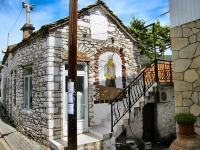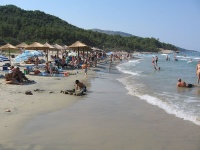Thassos Travel Guide
Historically, Thassos is among Greece's richest islands. Inhabited as far back as 2000 BC, its rich pine woods, white marble and wonderful climate made it attractive to Phoenician colonisers, Romans and Greeks. Today, visitors can see the legacies of these cultures at various archaeological sites. Limenas is the island's capital and main port, and visitors will find its old harbour full of colourful fishing boats and traditional tavernas. The lovely villages of Panagia and Potamia are within easy reach, while the quieter Kinira, with its pebbled beach, is a little further away. So too is the nudist, pinewood-ringed Paradise Beach. The west coast is home to a series of quaint fishing villages, interspersed with lovely coves and beaches. Visitors can explore charming old mountain settlements further inland.
Things to do in Thassos
Thassos has many wonderful attractions. Visitors can still see the 7th-century ruins of Ancient Thassos in the capital, Limenas, and the 12th-century Archangelou Michail Monastery in the island's southeast region. Thassos also has a number of interesting museums and archaeological sites, plus an excellent street market. Outside of Limenas, the island's small villages feel authentic and undisturbed. Many have their own markets and quaint folk museums. Nature lovers will enjoy Thassos' beaches, lakes and waterfalls. Scala Potamia and Golden Beach are both loved for the calm waters that make them child-friendly. Visitors who enjoy wandering along picturesque trails can try horse riding, which is a popular activity on the island.

Prinos Street Market
Located on the northwest coast of Thassos is the major port of Skala Prinos. Each Monday morning, locals and tourists wander through the Prinos Sreet Market. The market offers a selection of fresh fruit and vegetables, as well as a good assortment of nuts. Leather goods are also available from the market, as well as shoes and clothes. As with most markets of this kind there are seldom changing rooms to use for trying on clothes so shoppers have to try on what they can at the stall, or guess their size. The market is small enough to feel quaint and friendly but large enough to have a good bustle and selection of goods. Skala Prinos also has some really lovely sandy beaches with shallow, clear, calm waters which are perfect for children and have great views of the mainland. It is wonderful to pop to one of the beaches after a quick exploration of the market for a refreshing swim.

Theologos
The history of Thassos is uncovered at the Museum Theologos, set in an old mansion that was the home of the mountain village's former mayor, Mr Chatzigeorgiou. The mayor played an essential role in the revolution against the Turks that took place on the island in 1821. Exhibits include displays of olive presses, flour mills, tools, looms and chests from the 18th century, as well as some wonderful pictures. The museum is only one interesting aspect of this fascinating old town, situated up in the mountains. It is worth visiting just to stroll through the picturesque streets and stumble over all the evidence of antiquity. Theologos used to be the most important village on the island and was both the political and economic centre of Thassos, which is why the museum is situated here. Theologos was declared a cultural capital by the Greek government in 1979, which means that construction or alteration to existing buildings is limited to preserve the authentic old architecture. The village has also preserved many folk traditions and still produces its own olives, vegetables, alcohol and lamb, so that when visitors have a meal at the local taverna, they will almost certainly be eating local produce.

Thassos Beaches
Most visitors to Thassos are drawn by the stunning white sandy beaches on the east cost of this island. The more popular beaches have all the required tourist amenities, but despite this the beaches have retained their natural beauty and have not been ruined by crowds or infrastructure. The largest and most popular beach is Chrissi Ammoudia (Golden Beach), a sweeping strech of white sand that is set against the towering slopes of Mount Ipsario, which rises to 1,200m (4,000 ft). Tripiti Beach, on the south of the island, is known for its natural bathtub and a cave leading to the Aegean Sea. It is a big beach, quite far from the main town, and boasts rich marine life in its waters. Livadi is popular with campers and backpackers and is a protected cove. Makriammos is a beautiful, long, sandy beach and is a favourite for many; it is also home to some great mussels. Pefkari has bars, taverns and a small kiosk, and watersports include banana boat rides, jet-skiing and paragliding. The nudist beach of Paradise is one of the most beautiful on the island, as the name suggests. It is not exclusively a nudist beach but nudity is tolerated. The eastern beaches are the calmest and Scala Potamia and Golden Beach are two of the best for small kids as they are sandy with shallow, calm waters.
Shopping
Thassos' main shopping areas are in the capital, Limenas, and in the holiday resorts. Limenas has many boutiques, gift shops and souvenir stores. On Mondays mornings, locals and tourists head to the street market in Prinos, where visitors can buy some charming crafts and food stuffs, such as wine, olives and honey. Pottery, leather goods and embroidered linens are also available, as are good quality shoes, clothes, antiques and jewellery. Local products such as marble, olive oil, thyme-scented honey and olive-wood carvings make excellent souvenirs.
Nightlife
Thassos' nightlife is both lively and varied. For the most part, bars, cafes and restaurants are in the capital, Limenas, though holiday resorts sometimes host events. Visitors will also find live entertainment on many beaches during summer.
Thassos Climate and Weather
Thassos' location makes it an appealing destination, even by Greece's lofty standards. The mainland shelters it from winds that affect more northern islands, and it's a little cooler than its neighbours to the south. With its Mediterranean climate, rain is unlikely in summer and falls mainly in the winter months. Spring is also a good time to visit, when the island is lush, sun-filled and generally rain-free. Autumn is also popular, as holidays are cheaper, the crowds have gone, and the weather and ocean temperatures remain pleasantly warm.
Greece travel info
Electricity
Electrical current is 230 volts and 50Hz. A variety of plugs are in use, including the European-style two-pin and the round three-pin.
Language
Greek is the national language, but English is widely spoken.
Money
The official currency is the euro (EUR), which is divided into 100 cents. All major credit cards are accepted and ATMs are widespread.
Tipping
A service charge is automatically added to most restaurant bills and an additional tip is not expected, though it's always welcome. Rounding up the bill is sufficient for drinks at cafes; taxis, porters and cloakroom attendants will expect a tip.
Health
There are no specific health risks but everyone 12 years of age and older should get fully vaccinated for COVID-19 before visiting Greece. Most health problems come from too much sun and too much food or alcohol, though there's also the risk of encountering sea urchins, jellyfish and mosquitoes. Medical facilities in major cities are excellent but some of the smaller islands are a long way from a decent hospital. Larger towns and resorts have English-speaking private doctors and the highly professional local pharmacies can usually deal with any minor complaint. Travellers should take along any necessary prescription medication. Food and water are safe, but those visiting for short periods should consider sticking to bottled water. After Brexit, the Global Health Insurance Card (GHIC) replaced the European Health Insurance Card (EHIC) for UK citizens. The GHIC allows UK citizens access to state healthcare during visits to the EU. The GHIC is not valid in Norway, Iceland, Liechtenstein or Switzerland, nor is it an alternative to travel insurance.
Safety
Though Greece is a safe destination, peak tourist season usually sees a spike in petty theft cases, especially in crowded areas. Visitors should conceal valuables or store them in hotel safes and watch out for pickpockets. Violent crime is rare but there have been incidents on some islands; visitors travelling alone should not accept lifts from strangers.
Local customs
Though more traditional than the British in some ways, most Greeks are friendly and welcoming enough to seem intrusive to reserved British tourists. Greeks are also the heaviest smokers in Europe and will often ignore the smoking ban in public places. Swimwear is expected on the beach but tourists should dress properly in bars and restaurants.
Doing business
Greeks prefer to dress formally in dark-coloured suits for men and stylish outfits for women. Punctuality is important to them though meetings may not start immediately. Visitors should offer a firm handshake and maintain eye contact when greeting Greek men and women for the first time, and print business cards in both Greek and English. There is no ritual surrounding the exchange of business cards.
As Greeks like getting to know their colleagues before conducting any serious business, it's unlikely a deal will take shape at the first meeting. The local culture follows a hierarchical structure and visitors should show respect in the same way. Gift giving is common in social settings but not necessarily in business.
Duty free
Travellers visiting from inside the EU can bring in 800 cigarettes, or 200 cigars, or 400 cigarillos, or 1kg of tobacco, 10 litres of spirits with an alcohol volume over 22 percent, 20 litres of spirits with an alcohol volume under 22 percent, 90 litres of wine and 110 litres of beer.
Visitors arriving from outside the EU and are over the age of 17 will not pay duty for 200 cigarettes, or 50 cigars, or 100 cigarillos, or 250g of tobacco, 1 litres of spirits with an alcohol volume over 22 percent, 2 litres of spirits with an alcohol volume under 22 percent, 4 litres of wine and 16 litres of beer.
Communications
The international access code for Greece is +30 and the outgoing code is 00, followed by the relevant country code (e.g. 0044 for the United Kingdom). Free WiFi is available at cafes, hotels, restaurants and similar establishments throughout Greece; purchasing a local prepaid SIM card can be a cheaper option to paying high international roaming costs.
Passport & Visa
The borderless region known as the Schengen Area includes the following countries: Austria, Belgium, Czech Republic, Denmark, Estonia, Finland, France, Germany, Greece, Hungary, Iceland, Italy, Latvia, Lithuania, Luxembourg, Malta, The Netherlands, Norway, Poland, Portugal, Slovakia, Slovenia, Spain, Sweden, and Switzerland. All of these countries issue a standard Schengen visa that has a multiple entry option, and which allows the holder to travel freely within the borders of all the aforementioned countries.
Non-EEA travellers to Greece must hold visible means of financial support to cover their stay in the country. It is also recommended that non-EEA members hold return or onward tickets, and the necessary travel documentation for their next destination. Passengers not holding onward tickets may be asked for proof of sufficient funds for their return or onward journey. It is highly recommended that travellers' passports have at least six months' validity remaining after the intended date of departure from their travel destination. Immigration officials often apply different rules to those stated by travel agents and official sources.
Entry requirements
US citizens must have a passport that is valid three months beyond the period of intended stay. No visa is required for a touristic stay of up to 90 days within a 180 day period.
British passports endorsed 'British Citizen', 'British Subject' (containing a Certificate of Entitlement to the Right of Abode issued by the United Kingdom), and 'British Overseas Territories Citizen' issued by Gibraltar, only need to be valid for period of intended stay in Greece. All other endorsements require at least three months validity beyond the period of intended stay in Greece.
A visa is not required for passports endorsed 'British Citizen', 'British Subject' (containing a Certificate of Entitlement to the Right of Abode issued by the United Kingdom), and 'British Overseas Territories Citizen' issued by Gibraltar. No visa is required for stays of up to 90 days in a 180 day period for holders of passports with any other endorsement.
Holders of identity cards issued by Gibraltar authorities, and endorsed 'Validated for EU travel purposes under the authority of the United Kingdom', do not require a visa to visit Greece.
Canadian citizens must have a passport that is valid for at least three months beyond the period of intended stay in Greece. No visa is required for a touristic stay of up to 90 days within a 180 day period.
Australian citizens must have a passport that is valid for at least three months beyond the period of intended stay in Greece. No visa is required for a touristic stay of up to 90 days within a 180 day period.
South African citizens must have a passport that is valid for at least three months beyond the period of intended stay, and a valid Schengen visa, to enter Greece.
Irish citizens must have a passport that is valid on arrival in Greece. No visa is required.
New Zealand citizens must have a passport that is valid for at least three months beyond the period of intended stay in Greece. No visa is required for a touristic stay of up to 90 days within a 180 day period.
Useful contacts
Greek National Tourism Organisation, Athens: +30 21 870 7000.
112 (general European emergency number); 1571 (tourist police)Embassies / consulates in other countries
Greek Embassy, Washington DC, United States: +1 202 939 1300.
Greek Embassy, London, United Kingdom: +44 20 7313 5600.
Greek Embassy, Ottawa, Canada: +1 613 238 6271.
Greek Embassy, Canberra, Australia: +61 2 6271 0100.
Greek Embassy, Pretoria, South Africa: +27 12 348 2352.
Greek Embassy, Dublin, Ireland: +353 1 676 7254.
Greek Embassy, Wellington, New Zealand: +64 4 473 7775.
Embassies / consulates in Greece
United States Embassy, Athens: +30 21 721 2951.
British Embassy, Athens: +30 21 727 2600.
Canadian Embassy, Athens: +30 21 727 3400.
Australian Embassy, Athens: +30 21 870 4000.
South African Embassy, Athens: +30 21 617 8020.
Irish Embassy, Athens: +30 21 723 2771.
New Zealand Consulate-General, Athens: +30 21 692 4136.



